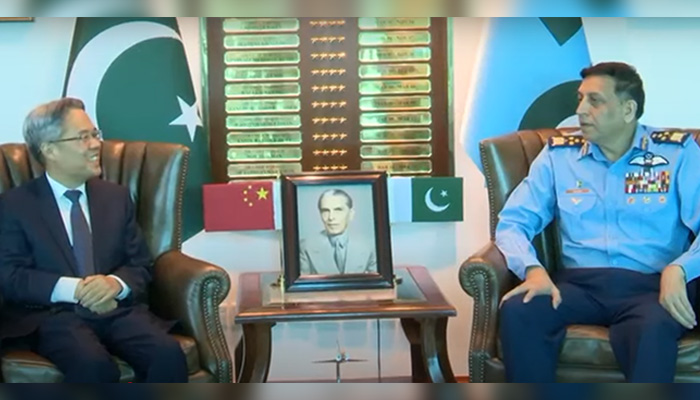Chinese envoy praises PAF's unmatched operational excellence during recent standoff
Zaidong assures air chief of China's technical support to bolster PAF's aerial defence capabilities
Chinese Ambassador to Pakistan Jiang Zaidong met Air Chief Marshal Zaheer Ahmed Baber Sidhu on Tuesday and lauded the unmatched operational excellence demonstrated by PAF personnel during the recent standoff on the eastern front.
The Chinese envoy termed it a reflection of PAF's high standards and unwavering commitment to national defence.
Zaidong called on the chief of the air staff during his visit to Air Headquarters, Islamabad, the Inter-Services Public Relations (ISPR) said.
They underscored the importance of cohesive and collaborative approaches in responding to emerging challenges, emphasising the necessity of maintaining peak operational readiness and swift coordination amidst the prevailing regional security dynamics.
The air chief extended a gracious welcome to the distinguished guest, reiterating that Pakistan and China enjoy historic and time-tested ties rooted in mutual trust, strategic convergence and shared aspirations for regional peace and stability.
He described the two nations as "Iron Brothers", emphasising that their bond has only strengthened over the decades and will continue to deepen through future cooperation and partnership.
The chief of the air staff expressed his profound gratitude to China for its continued support and unwavering friendship.
He also commended China's role in assisting Pakistan's defence modernisation and technological advancement especially in areas of human resource development, technology transfer and collaborative research and development.
Both the dignitaries reaffirmed their pledge to institutionalise regular high-level exchanges through expanded joint operational exercises and exploration of multilateral frameworks that bolster collective response mechanisms to emerging threats.
The Chinese ambassador lauded the unmatched operational excellence demonstrated by PAF personnel during the recent standoff on the eastern front, terming it a reflection of PAF's high standards and unwavering commitment to national defence.
He praised the Pakistan Air Force for its exemplary professionalism and commendable utilisation of Chinese-origin equipment and technology to thwart enemy aggression.
The dignitary also acknowledged PAF's operational effectiveness and strategic acumen in employing indigenous solutions and advanced systems to safeguard national interests and deter potential threats under the current leadership.
Reaffirming China's enduring support, Zaidong assured full technical assistance to PAF in order to bolster its aerial defence capabilities.
He also lauded Pakistan's commitment to self-reliance and emphasised that PAF's investment in indigenous processes had begun to yield promising results.
He stressed that continued focus on homegrown technological development would further elevate the country’s defence capabilities.
This meeting stands as a testament to the shared resolve of Pakistan and China to advance their time-tested strategic partnership through deepened cooperation and innovation-driven collaboration.
It came days after Pakistan armed forces launched a large-scale retaliatory military action, named "Operation Bunyan-um-Marsoos", and targeted several Indian military targets across multiple regions in response to neighbour's unprovoked strikes.
The strikes, described by officials as "precise and proportionate", were carried out in response to India's continued aggression across the Line of Control (LoC) and within Pakistan's territory, which New Delhi claimed were aimed at "terrorist targets".
Pakistan downed its six fighter jets, including three Rafale, and dozens of drones. After at least 87 hours, the war between the two nuclear-armed nations ended on May 10 with a ceasefire agreement brokered by the United States.
The military confrontation between the two countries was triggered by last month’s attack in Indian Illegally Occupied Jammu and Kashmir (IIOJK) that left 26 tourists dead, with India blaming Pakistan for the attack without offering any evidence.
-
Security forces gun down 30 terrorists in multiple IBOs in KP: ISPR
-
MQM-P calls for new province in Sindh
-
US report validates Pakistan military edge over India: PM
-
Banned TTP poses serious threat to Pakistan security: UNSC panel
-
CM Afridi clarifies remarks on by-poll after ECP requests army deployment
-
Dubai sees 3.2m Pakistani passengers in 2025 as airport sets new milestone
-
Security forces kill 23 Indian proxy terrorists in KP's Kurram
-
Pakistan to construct island to boost oil exploration: report












